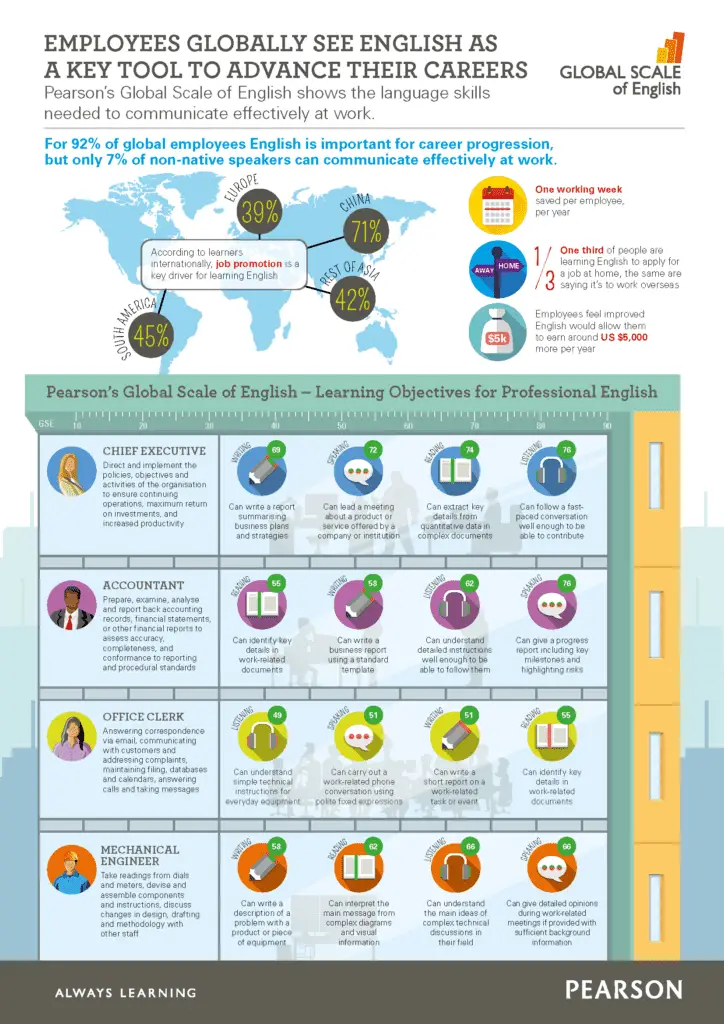With over 1.4 billion speakers (both native and non-native) English is undeniably the modern global Lingua Franca. The population of English speakers is nearly one-third of the entire planet!
As a language spoken around the world, learning English provides you with access to opportunities you would never have otherwise. From business, to science, and even the majority of the internet. English provides you with experiences and knowledge you can get nowhere else.
1. Access to most of the internet.
Current estimates for content on the internet rank English as the most prevalent language on the net (source). Almost 60% of websites online today are written in English.
If you learn English, you gain access to all this knowledge hosted on English webpages and even to vibrant communities of English speakers you can engage with.
Some of the most popular websites in the world host all or most of their content in English.
2. Easy Travel
There are an estimated 700 million non-native English speakers across the entire world. Wherever you travel, there is a good chance that you will run into someone who speaks at least a little bit of English.
This makes English the perfect language to learn for travel. You will always have an opportunity to make use of your English skills while traveling, but you might not have the same opportunities with other languages.
Due to its status as a Lingua Franca, many countries print signs and other tourist information in English. This widens the accessibility of this information to more people.
Most western countries have a population who can speak English. This is true even for countries where English is not the majority language. All Europeans can speak at least some English (many can speak English quite well). The same is true for countries around the world such as India, the Philippines, China, Brazil, and many Middle Eastern countries.
Knowing English opens up many exciting opportunities for travel. It allows you to communicate with a diverse range of peoples from cultures around the world.
Live Abroad
Another exciting possibility for English foreign language learners is the opportunity to live abroad. English speaking countries have some of the highest standards of living and are home to some of the world’s most prestigious colleges and universities.
These facts make living in English-speaking western countries a very popular goal for many people around the world.
People with a knowledge of English can take full advantage of these opportunities to live, work, and study abroad.
The opportunities don’t stop with countries where English is the majority language either. There are many study programs hosted in English in foreign countries where English is not the majority language. These types of study opportunities give you the chance to live and study abroad in an even more diverse set of countries. All because you know how to speak and understand English!
3. More Job Opportunities
Knowledge of English can have a direct impact on your career. Research conducted by Pearson found that employees who know English receive on average $5000USD more per year than employees who don’t.
This is great to know, but it is only the tip of the ice berg for potential prospects with English.
As we have spoken about previously, English is a language found all over the world. This means that many businesses conduct transactions in English even if neither of the businesses are based in English speaking countries.
Additionally, majority English countries are some of the richest in the world. These countries are home to huge multi-national corporations which conduct business across the globe. Having access to English language skills automatically makes you an important and indispensable employee.
English can give you the opportunity to receive promotions that would never have been possible without some skill in English.
English is also the official language of many international organizations such as the United Nations, the World Health Organization, and the International Monetary Fund. Career prospects exist here too for those who are involved in government or central banking.
4. Stay Informed
As a professional in any field, you are doing yourself a disservice if you do not learn English.
The majority of research conducted in the 21st century is published in English. This means that in order to stay informed with the latest discoveries in your field, you must read papers published in English.
Not knowing English cuts you off from direct access to the most cutting edge research. You must rely on others to translate this research into your native tongue. This is a problem because translations can be inaccurate or introduce personal bias. The best way to interact with any information is in its original language.
If you can read English well, you are able to interact directly with all the latest research published globally. This gives you an advantage compared to others in your field who do not understand any English.
5. English Media
Some of the most popular media franchises in the world are produced in English. From movies to TV shows, music, and video games, these types of media have enormous amounts of English content to consume for English speakers.
Frequently, non-native speakers of English interact with these products using things like subtitles or voice dubs. Wouldn’t it be great to be able to watch an English TV show or movie without subtitles or a dub? Of course it would. This is one of the reasons why learning English is an advantage.
Aside from globally popular media. There are also many English books, songs, movies, and TV shows that will never be translated into other languages. Being unable to understand English cuts you off from these wonderful materials.
Learning English opens up an entire world of English media that you could never have enjoyed before.
6. Rich History
The English language has a long and fascinating history. The story of how English went from a minor language spoken by a small group of people on an island to the global super power it is today is very interesting!
You gain direct access to this fantastic history when you learn English. Like in all languages, there are words and phrases that speakers of English use every day that are steeped in history.
English is a language that has a huge vocabulary. There are over 600000 English words and many of them have been borrowed from other languages. There is a long history of contact among English, French, and Latin/Greek. These languages have given English a wealth of vocabulary and equally interesting stories to go along with it.
For example, did you know that all of the English months of the year come directly from Latin? I wrote an article about that which you can read here.
What about the reasons why animals have one name in English, but the meat products from those animals have a different name? I also wrote about this fascinating story. You can read that here.
To read more interesting stories and learn about the hidden history of the English language, check out my articles here!
7. Stay Healthy
Learning a second language can help keep your brain healthy!
It’s true. Learning a second language has been shown to promote healthy changes in your brain that help you learn new information faster, improve memory, and avoid age related brain diseases such as alzheimer’s and dementia.
But that’s not all, learning a second language can even improve your skills with your native one. The reason is while learning a second language you will learn about the grammar rules governing how to form sentences in English. This knowledge expands your awareness of grammatical structures and provides you with the vocabulary to describe them.
Being exposed to the different ways a foreign language expresses ideas can directly improve your knowledge of your native language through comparison as much as through the new knowledge you learn.
Additionally, you will spend time translating sentences between the two languages. Translation is a skill that requires a lot of knowledge of the languages you are translating between. Many times, you will find that you cannot translate complex or abstract ideas directly between languages. So you must use your knowledge of each language to present ideas in the clearest way and not merely a direct translation.
Conclusion
Learning a second language is a life long journey that will give you many benefits. From providing you with unique opportunities unavailable to monolingual people to improving your health, and exposing you to a whole new culture and way of thinking. Learning a second language is a skill everyone should dedicate some time to in their lives.




